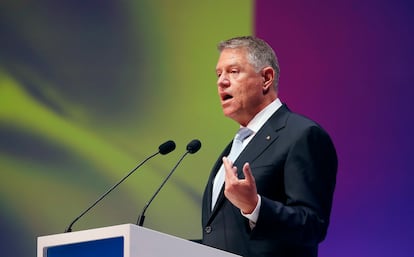Romania’s president announces his bid to become the NATO military alliance’s next leader
His announcement will pit him against outgoing Dutch Prime Minister Mark Rutte, who is considered the favorite to replace Stoltenberg and has the tacit support of most member countries

Romania’s president said Tuesday that he will enter the race to become the next leader of the 32-nation NATO military alliance, emphasizing his country’s proximity to Ukraine and the threat from Russia.
President Klaus Iohannis wants to succeed Secretary-General Jens Stoltenberg, who has been NATO’s top civilian official since 2014 and has made clear he will not be staying.
Romania, a NATO member since 2004, borders Ukraine and has played an increasingly prominent role in the alliance throughout Russia’s full-scale invasion, including hosting a NATO meeting of foreign ministers in November 2022. In November last year, Romania inaugurated an international training hub for F-16 jet pilots from allied countries and other partners, including Ukraine.
“Russia is proving to be a serious and long-term threat to our continent, to our Euro-Atlantic security,” Iohannis said. “Under these conditions, NATO’s borders become of paramount importance, and the strengthening of the eastern flank ... will remain a long-term priority.”
He said he believes NATO needs a “renewal of perspectives” and that the historical challenges Eastern Europe has faced could provide that in the face of Russian aggression. Many of NATO’s easternmost members have expressed concern about Russia’s attempts to reassert influence over their region, with memories of living under Soviet influence still strong for some.
Romania has increased defense spending over the past two years while NATO bolstered its presence on Europe’s eastern flank by sending additional multinational battle groups to alliance members.
The 65-year-old Iohannis is coming to the end of his second five-year term as Romania’s president.
His announcement will pit him against outgoing Dutch Prime Minister Mark Rutte, who is considered the favorite to replace Stoltenberg and has the tacit support of most member countries.
The Baltic states — Estonia, Latvia, and Lithuania — want one of their top officials to get the job, while Turkey and Hungary have expressed reservations about Rutte. They may want to win concessions from other countries in exchange for their support, as they did before they would accept Sweden’s membership in NATO. Neither has proposed an alternative candidate.
U.S. President Joe Biden and his NATO counterparts had been due to name a successor to Stoltenberg when they met in Lithuania in July 2023. But the world’s biggest security organization makes decisions by consensus, and no agreement could be found.
NATO officials and envoys want the nomination wrapped up by the end of April, before competition for top European Union jobs begins in earnest around the June 6-9 elections. They are keen to avoid having the potentially divisive issue mar the alliance’s 75th anniversary summit in Washington in July.
NATO secretaries-general are responsible for chairing meetings and guiding sometimes delicate consultations among member countries to ensure that an organization that operates on consensus can continue to function. They also ensure that decisions are put into action and speak on behalf of all nations with one voice.
Sign up for our weekly newsletter to get more English-language news coverage from EL PAÍS USA Edition
Tu suscripción se está usando en otro dispositivo
¿Quieres añadir otro usuario a tu suscripción?
Si continúas leyendo en este dispositivo, no se podrá leer en el otro.
FlechaTu suscripción se está usando en otro dispositivo y solo puedes acceder a EL PAÍS desde un dispositivo a la vez.
Si quieres compartir tu cuenta, cambia tu suscripción a la modalidad Premium, así podrás añadir otro usuario. Cada uno accederá con su propia cuenta de email, lo que os permitirá personalizar vuestra experiencia en EL PAÍS.
¿Tienes una suscripción de empresa? Accede aquí para contratar más cuentas.
En el caso de no saber quién está usando tu cuenta, te recomendamos cambiar tu contraseña aquí.
Si decides continuar compartiendo tu cuenta, este mensaje se mostrará en tu dispositivo y en el de la otra persona que está usando tu cuenta de forma indefinida, afectando a tu experiencia de lectura. Puedes consultar aquí los términos y condiciones de la suscripción digital.








































